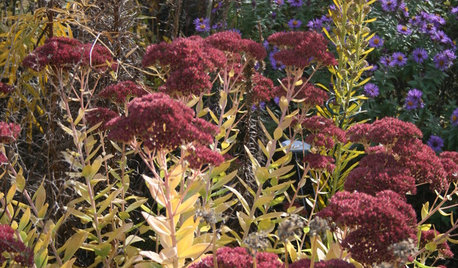Size of the Garden Book Market?
trianglejohn
21 years ago
Related Stories

DECORATING GUIDESFlea Market Finds: Botanical Prints
Historical Plant Illustrations Flourish on the Wall
Full Story
DECORATING GUIDESFlea Market Finds: Demijohns Around the Home
Once purely functional, now decorative, these bottles are worth the hunt
Full Story
DECORATING GUIDESBook to Know: 'Flea Market Chic'
Think flea market finds are just old junk not fit for a modern home? If so, it's time for a read and a rethink
Full Story
SHOP HOUZZShop Houzz: In the Market for Fresh Herbs
Add a fresh look or scent to your home with these herb-inspired finds
Full Story
GARDENING GUIDES8 Perennials for Great Fall Color
Trees haven't cornered the market on autumn splendor. Add these flowering perennials for a foliage sight to behold
Full Story
EVENTS5 Big Trends From This Week’s High Point Market
Learn the colors, textures and shapes that are creating a buzz in interior design at the market right now
Full Story
Common Materials Go Haute at High Point Market
Inventive furniture, lighting and artwork made from everyday items provided unexpected visual treats at the 2012 market
Full Story0

DECORATING GUIDESBone Made Strong Showing at High Point Market
From small boxes to big lighting fixtures, bone and bone inlay had a solid presence at the 2012 High Point Market
Full Story
ACCESSORIESHigh Point Market Branches Out Into Natural Decor
Branches, driftwood, shells and sustainable materials were big trends in decor items at the 2012 High Point Market. Take a peek here
Full Story
MOVINGTips for Winning a Bidding War in a Hot Home Market
Cash isn’t always king in a bidding war. Get the home you want without blowing your budget, using these Realtor-tested strategies
Full StorySponsored






acj7000
trianglejohnOriginal Author
Related Professionals
Belmont Landscape Architects & Landscape Designers · Ferndale Landscape Architects & Landscape Designers · Surprise Landscape Contractors · Fort Payne Landscape Contractors · Fort Worth Landscape Contractors · Fountain Valley Landscape Contractors · Matteson Landscape Contractors · Oklahoma City Landscape Contractors · Peachtree City Landscape Contractors · Thonotosassa Landscape Contractors · Fountain Fence Contractors · Pasadena Fence Contractors · Tulsa Fence Contractors · West Sacramento Fence Contractors · Agoura Hills Stone, Pavers & Concreteeddie_ga_7a
susieQherbs
John_D
Rosefiend
alpiner
pinetree30
John_D
jonathan_e
pinetree30
jonathan_e
lubird